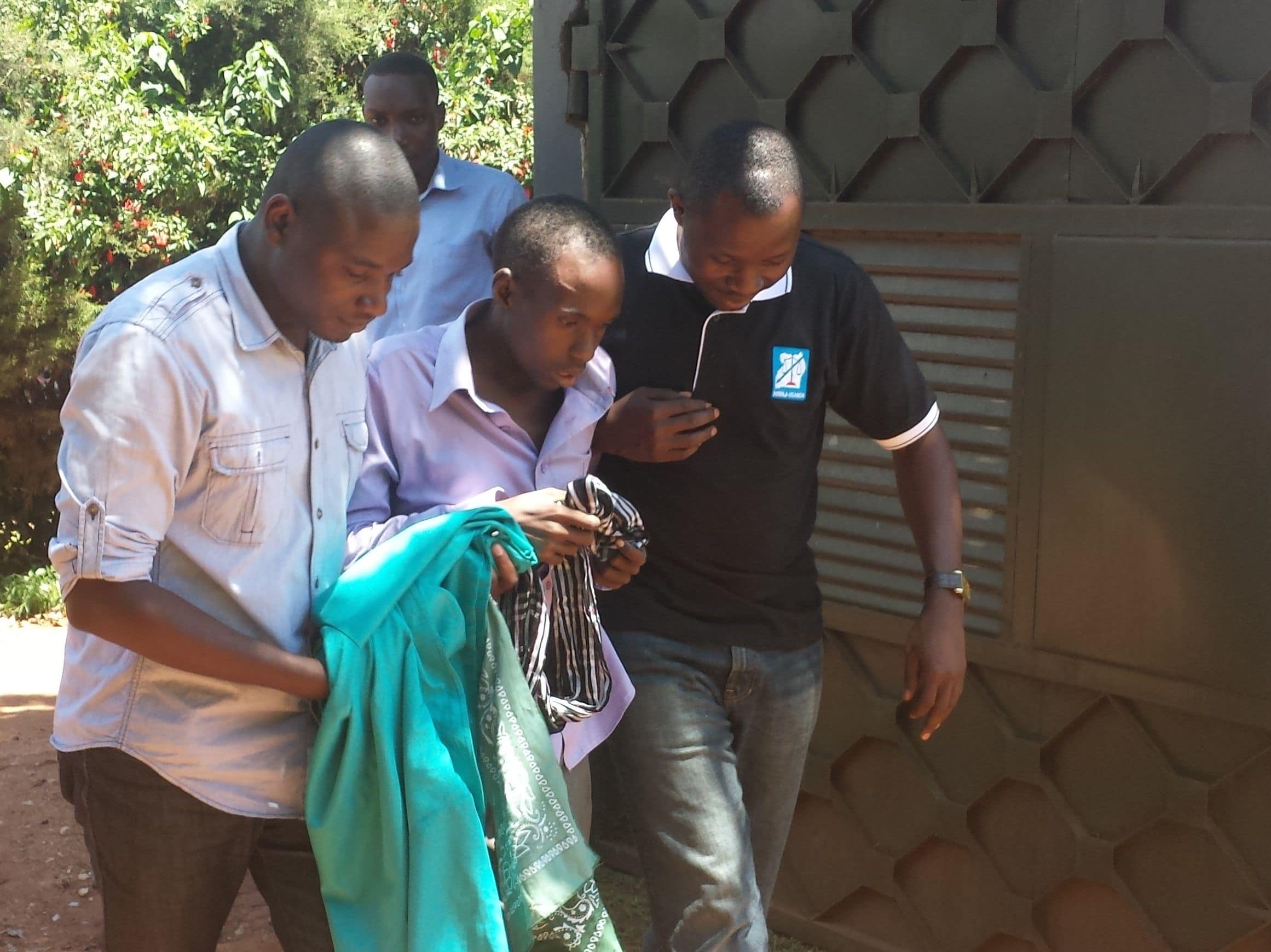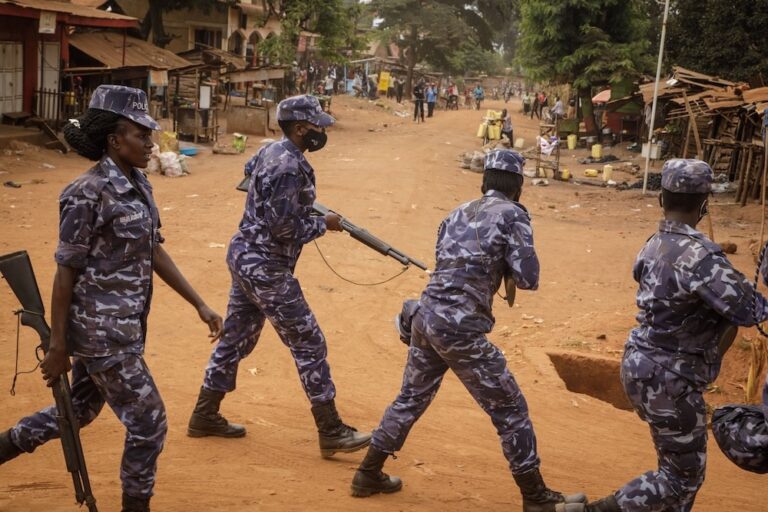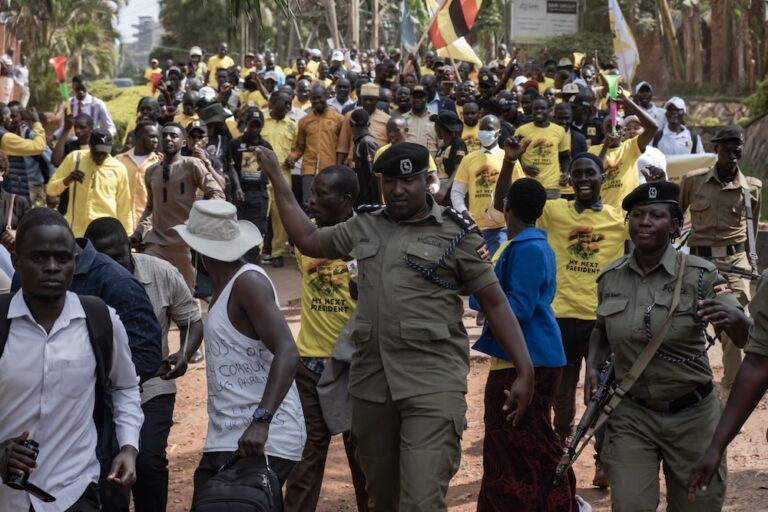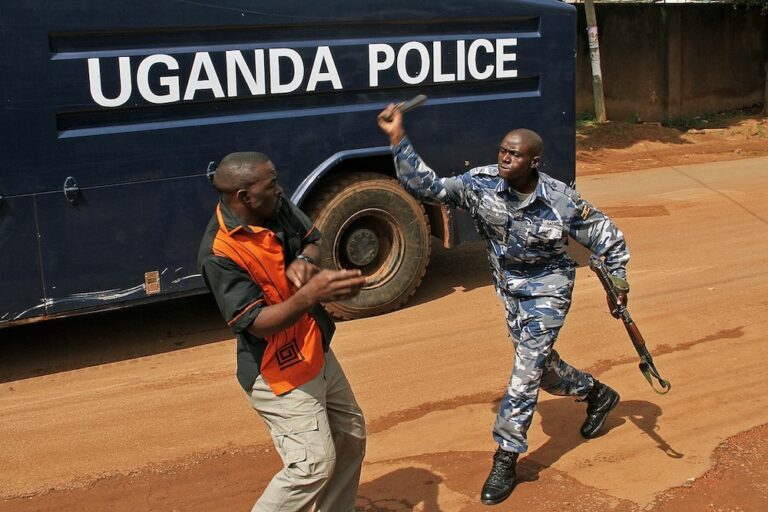HRNJ-Uganda vows to fight criminal defamation following the recent sentencing of Ronald Ssembuusi. Ssembussi was ordered to pay a large fine or serve a jail term over a story he aired in 2011.
This article was originally published on hrnjuganda.org on 17 October 2014.
Human Rights Network for Journalist-Uganda (HRNJ-Uganda) is deeply saddened by the sentencing of a Central Broadcasting Services (CBS) radio journalist Ronald Ssembuusi on 17 October 2014 by Kalangala Magistrate’s Court. Ssembuusi has been ordered to pay a fine of one million shillings [approximately USD $374.50]. The fine – which breaks down into UGX 500,000 to the court and UGX 500,000 to the complainant – must be paid within one month from today, or Ssembuusi must serve a jail term of one year. This is after the Grade 1 Magistrate, Kenneth Gimugum, convicted Ssembuusi of criminal defamation on 3 October 2014 after two years of trial. The sentence comes just a day after Ssembuusi was discharged from Mengo hospital where he was admitted on 10 October – the very day he collapsed outside of the HRNJ-Uganda offices in Kampala due to his ailing health situation.
On 3 December 2012, Ssembuusi was charged with criminal defamation – contrary to section 179 and 180(1) of the Penal Code Act – for reporting a story on CBS radio on 17 November 2011 to the effect that the former Kalangala LC 5 chairman Daniel Kikola was being investigated in connection with the disappearance of solar panels donated to Kalangala district by the African Development Bank, to pump clean water in the area.
This conviction and sentencing has hampered Ssembuusi, at only 25 years, in early stages of his career with a criminal record that may preclude him from practicing his journalism profession without fear; and is likely to shun critical reporting. He is humiliated, his image has been polluted a criminal and his dignity eroded because he raised a news story of public concern on the mismanagement and misappropriation of public resources as well as the conduct of leaders of Kalangala district.
HRNJ-Uganda is determined to assist Ssembuusi to overcome this shame by appealing against this conviction and the sentence. We have very fertile grounds for appeal, and we believe that the High Court will overturn this judgment.
HRNJ-Uganda is disturbed that criminal defamation remains on our law books and continues to be used to silence critical reporting. It remains a huge obstacle to media freedom as enshrined in our constitution; it inhibits the media’s role as watchdog for the society.
Criminal defamation has received wide resentment around the world; unfortunately for Uganda’s case, a panel of five constitutional court justices led by Justice Stephen Kavuma upheld that the offence is “…a safeguard against the infringement of a person’s reputation.”
The African Commission on Human and Peoples’ Rights, in November 2010 passed a resolution stating that: “criminal defamation laws constitute a serious interference with freedom of expression and impedes on [sic] the role of the media as a watchdog, preventing journalists and media practitioners to practice [sic] their profession without fear and in good faith;” The Commission called upon State parties to repeal criminal defamation laws because they impede on freedom of speech.
The African Union (AU) Special Rapporteur on Freedom Expression and Access to Information, Pansy Tlakula has noted that: “criminal defamation laws are nearly always used to punish legitimate criticism of powerful people rather protecting the right to reputation.” The Pan African Parliament has called upon African leaders to sign onto the Declaration of Table Mountain, which calls for the repeal of criminal defamation laws across Africa.
In April 2014, the constitutional court of Zimbabwe nullified criminal defamation stating that: “the offence of criminal defamation constitutes a disproportionate instrument for achieving the intended objective of protecting the reputations, rights and freedoms of other persons. In short, it is not necessary to criminalize defamatory statements.”
In 2009, the United Kingdom abolished criminal defamation entirely from their legal system. We therefore want the following;
1. In light of the above, HRNJ-Uganda has decided to make all efforts to have this particular law expunged from Uganda’s law books.
2. We call upon the Ugandan Parliament to repeal this law of criminal defamation because it’s a claw back to the freedoms as enshrined in the constitution and other regional and international treaties to which Uganda is a party.
3. We also call upon the Inspector General of Government (IGG) and the Inspector General of Police (IGP) to commission investigations into the disappearance of solar panels in Kalangala district for four consecutive times and bring the culprits to book. We should remember that on June 11th 2010, the Permanent Secretary Ministry of Water and Environment wrote to the Clerk, Kalangala Town Council, alluding to lack of effective management oversight and theft of solar panels in the district.
In a democratic society accountability is an essential tool in assessing rule of law. Ugandans have a collective responsibility to hold their leaders accountable. An explanation from a public official is the least expected, however if a leader responds to public inquiries, and legitimate concerns by instituting criminal prosecution, it diminishes the rule of law and undermines democracy. The time has come for this country to do away with criminal defamation, which public officials have resorted to as a sword to persecute, silence and ban accountability demands from citizens.
Today, HRNJ-Uganda announces its resolve to fight the law of criminal defamation and calls on all stakeholders to join in this fight.
Let’s unite in defence of media freedom and journalist’s rights.
ROBERT SSEMPALA,
NATIONAL COORDINATOR.



